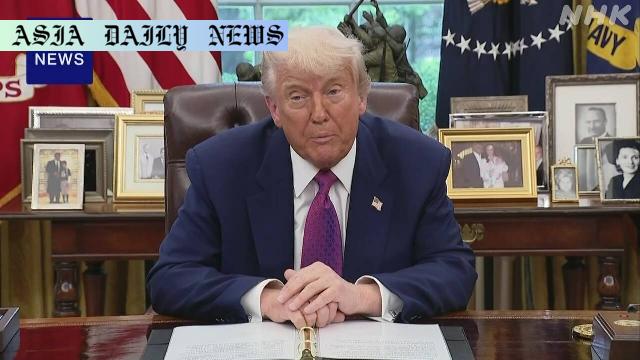Deportation — Lawyers reveal Trump admin deported Asian immigrants to unstable South Sudan, risking potential legal violations.

The Trump Administration’s Controversial Deportation Practices
The recent decision by the Trump administration to deport Asian immigrants to South Sudan has sparked outrage and legal scrutiny. Reports indicate that at least two individuals from Myanmar and Vietnam were removed from the United States and sent to the politically fragile and conflict-stricken African nation. This action raises significant questions about the ethical and legal framework under which such deportations take place.
The administration utilized the wartime ‘Alien Enemies Act’, a controversial piece of legislation that grants the President sweeping powers to detain or deport foreign nationals from enemy countries during periods of conflict. While this act has historical precedence, its application in this context has raised alarms among legal experts and human rights organizations. Sending these individuals to a country with ongoing armed clashes not only imperils their safety but also contravenes international norms regarding the treatment of asylum seekers and deportees.
Legal Challenges and Defiance of Court Orders
In April, a federal judge in Massachusetts ruled that the United States government must notify immigrants before deporting them to third-party nations where their safety could be at risk. This ruling sought to provide affected individuals with an opportunity to raise valid concerns and protect their rights. Despite this, the Trump administration proceeded with the deportation of these two individuals. On Tuesday, the same judge stepped in to hold the administration accountable, highlighting that officials could face criminal contempt charges for their defiance.
The deportations underscore a broader trend of sidestepping legal protocols under the guise of immigration reform. By ignoring court-mandated protections, the Trump administration has invited criticism from legal experts, human rights groups, and even lawmakers. This instance highlights the tension between executive authority and judicial oversight in navigating contentious immigration policies.
Humanitarian Crisis: Deportation to a Danger Zone
Deporting individuals to South Sudan, a nation riddled with armed conflict and political instability, creates alarming humanitarian concerns. The U.S. State Department itself has issued explicit warnings against traveling to South Sudan due to the risks of violence, abductions, and deteriorating conditions. For these deportees, the journey to such an environment amounts to a life-threatening ordeal. Many advocacy groups argue that such actions violate international human rights obligations and the moral compass of a country known for offering opportunities to immigrants and refugees.
South Sudan remains one of the most dangerous places in the world, where countless lives have been displaced or lost to civil war. Sending immigrants to such a fragile nation showcases a disturbing lack of foresight about the consequences of such policies. It also puts into sharp focus the need for a humanitarian lens when crafting immigration laws and policies.
The Ethical and Political Implications
Ethically, the deportations represent a failure to uphold America’s longstanding tradition of protecting vulnerable people fleeing persecution. Politically, they signal a shift in immigration policy that prioritizes punitive action over humane solutions. With a significant number deported to other nations like El Salvador, where safety concerns are equally pressing, the administration appears to be adopting a one-size-fits-all approach to immigration enforcement. This raises alarm among both U.S. citizens and the global community about the broader direction of America’s role in offering refuge.
The deportation incidents should serve as a wake-up call for lawmakers and policymakers to reconsider the implications of such measures. International legal frameworks, such as the United Nations Convention on the Status of Refugees, stress the importance of non-refoulement, a principle forbidding the return of refugees to places where they face serious threats. By contravening this principle, the U.S. risks isolating itself on the world stage and eroding its image as a bastion of human rights.
Commentary
Complex Challenges in Immigration Policy
The recent deportation of immigrants to South Sudan has brought to light the complexities and challenges of modern immigration policies. This incident not only underscores the inherent risks involved when global powers fail to abide by legal and moral responsibilities, but also raises profound questions about the balance between national security and human rights.
One of the most troubling aspects of this case is the apparent disregard for judicial mandates. Legal systems are designed to serve as checks and balances on executive authority, ensuring no single branch of government wields unchecked power. By deporting immigrants despite court orders, the Trump administration sets a concerning precedent, signaling to the world that legal rulings can be ignored with minimal consequence. This erodes trust in U.S. governance and fosters a climate of uncertainty.
The Need for a Humanitarian Approach
While immigration enforcement is a sovereign right, it should be practiced within the realms of compassion and integrity. Deporting individuals to nations like South Sudan, where their lives are in immediate danger, is not only unethical but is also a violation of their basic rights. Immigration policies must be designed with a keen understanding of global realities and should prioritize the safety and well-being of those affected.
Furthermore, the reliance on outdated laws such as the ‘Alien Enemies Act’ to justify such actions is alarming. Modern-day challenges require modern solutions, and it is incumbent upon political leaders to legislate policies that reflect contemporary societal values.
A Call for Accountability and Reform
This issue serves as a call to action for reforms in immigration policy. Policymakers and lawmakers must work together to create a framework that upholds the principles of justice and humanity while addressing national security concerns. It is crucial for the United States to lead by example, demonstrating to the international community that compassion and security are not mutually exclusive.
The deportation to South Sudan is a stark reminder of the need for advocacy and oversight. As global citizens, it is our collective responsibility to hold governments accountable and to amplify the voices of those who cannot speak for themselves. Only then can we hope to build a world that values human dignity above all else.


